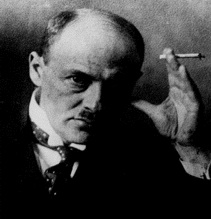Related Research Articles

Edmund Gustav Albrecht Husserl was an Austrian-German philosopher and mathematician who established the school of phenomenology.
This article contains information about the literary events and publications of 1928.
Kurt Schneider was a German psychiatrist known largely for his writing on the diagnosis and understanding of schizophrenia, as well as personality disorders then known as psychopathic personalities.

Max Ferdinand Scheler was a German philosopher known for his work in phenomenology, ethics, and philosophical anthropology. Considered in his lifetime one of the most prominent German philosophers, Scheler developed the philosophical method of Edmund Husserl, the founder of phenomenology. Given that school's utopian ambitions of re-founding all of human knowledge, Scheler was nicknamed the "Adam of the philosophical paradise" by José Ortega y Gasset.

Philosophical anthropology, sometimes called anthropological philosophy, is a discipline dealing with questions of metaphysics and phenomenology of the human person.
ZeniMax Media Inc. is an American video game holding company based in Rockville, Maryland. The company was founded in 1999 by Christopher Weaver and Robert A. Altman as the parent company for Weaver's video game publisher Bethesda Softworks. The company additionally owns the development studios Bethesda Game Studios, id Software, Arkane Studios, MachineGames (Wolfenstein), and ZeniMax Online Studios. Microsoft acquired ZeniMax Media for $8.1 billion in March 2021 and operates it under the Microsoft Gaming division.
Moritz Geiger was a German philosopher and a disciple of Edmund Husserl. He was a member of the Munich phenomenological school. Beside phenomenology, he dedicated himself to psychology, epistemology and aesthetics.
Ludwig Landgrebe was an Austrian phenomenologist and Professor of philosophy. He is the grandfather of award-winning German actor Max Landgrebe.

Max Bennet Kruse is a German former professional footballer who played as an attacking midfielder or forward.

Max Scheler (1874–1928) was an early 20th-century German Continental philosopher in the phenomenological tradition. Scheler's style of phenomenology has been described by some scholars as “applied phenomenology”: an appeal to facts or “things in themselves” as always furnishing a descriptive basis for speculative philosophical concepts. One key source of just such a pattern of facts is expressed in Scheler’s descriptive mapping of human emotional life as articulated in his seminal 1913–1916 work, Formalism in Ethics and Non-Formal Ethics of Values.

Peter Wust was a German existentialist philosopher who is unknown in the English realm, for his works has never been translated into English to this day.
Events in the year 1928 in Germany.
1947 in philosophy
1913 in philosophy
1924 in philosophy

Maximilian Meyer is a German professional footballer who plays as a midfielder for Swiss Super League club FC Luzern. He has represented the Germany national team.

Angelika Krebs is a German philosopher.
Max Roser is an economist and philosopher who focuses on large global problems such as poverty, disease, hunger, climate change, war, existential risks, and inequality.
Mimpathy is a philosophical concept related to empathy and sympathy. In Dagobert D. Runes' 1942 Dictionary of Philosophy, contributor Herman Hausheer defines mimpathy as the sharing of another's feelings on a matter, without necessarily experiencing feelings of sympathy.
Manfred S. Frings was a scholar of philosophy, a professor, and the editor of the German editions of Heidegger Gesamtausgabe and Max Scheler's works. He was known as the world's leading specialist in the philosophy of Max Scheler, he published over one hundred articles, and edited twenty-four books. He wrote The Mind of Max Scheler: The First Comprehensive Guide Based on the Complete Works, as well as the forward to Pope John Paul II's book, Primat des Geistes.
References
- ↑ "Max Scheler". Stanford Encyclopedia of Philosophy (SEP). Retrieved 23 January 2013.